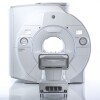Rush University Medical Center Cardiologists Use Adult Stem Cells to Repair Hearts Damaged By Coronary Heart Disease
by Amanda Doreson, Project Manager | January 19, 2007

Rush research scientists have performed
clinical trials to determine if a subject's
own stem cells can treat a form of
severe coronary artery disease.
clinical trials to determine if a subject's
own stem cells can treat a form of
severe coronary artery disease.
CHICAGO - Rush University Medical Center is one of the first medical centers in the country, and currently the only site in Illinois, participating in a novel clinical trial to determine if a subject's own stem cells can treat a form of severe coronary artery disease.
The Autologous Cellular Therapy CD34-Chronic Myocardial Ischemia (ACT34-CMI) Trial is the first human, Phase II adult stem cell therapy study in the U.S. designed to investigate the efficacy, tolerability, and safety of blood-derived selected CD34+ stem cells to improve symptoms and clinical outcomes in subjects with chronic myocardial ischemia (CMI), a severe form of coronary artery disease.
"What we're hoping is that these stem cells will be able to stimulate the growth of new blood vessels to bring more blood and oxygen to the heart muscle, so that these patients will have a better quality of life and less chest pain," said Dr. Gary Schaer, director of the Rush Cardiac Catheterization Lab and study investigator.
Myocardial ischemia is a serious heart condition that involves narrowing of coronary arteries and results in limited blood flow to the heart. The disease affects hundreds of thousands of new people each year. A person who suffers from chronic myocardial ischemia continues to experience insufficient flow of oxygen-rich blood to the heart despite optimum medical intervention.
The study is a randomized, double-blind, placebo-controlled study that involves adult subjects with severe coronary artery disease who are currently on the maximum medical therapy and who are not suitable candidates for conventional procedures to improve blood flow to the heart such as angioplasty, stents, or coronary artery bypass surgery.
Rush is one of 15 to 20 research sites nationwide participating in the study, which is sponsored by the Cellular Therapies business unit of Baxter Healthcare Corporation. Baxter technology is used to select the subject's own CD34+ stem cells that are under investigation in this trial.
The baseline frequency and severity of anginal episodes are established as a first step for all study subjects. Next, all subjects receive a series of subcutaneous injections (needle shots, typically delivered under the skin in the arm, thigh or abdomen) of a commercially produced protein (granulocyte colony stimulating factor). The protein helps to release CD34+ stem cells (also known as endothelial progenitor cells) from a subject's bone marrow into the bloodstream.
The Autologous Cellular Therapy CD34-Chronic Myocardial Ischemia (ACT34-CMI) Trial is the first human, Phase II adult stem cell therapy study in the U.S. designed to investigate the efficacy, tolerability, and safety of blood-derived selected CD34+ stem cells to improve symptoms and clinical outcomes in subjects with chronic myocardial ischemia (CMI), a severe form of coronary artery disease.
"What we're hoping is that these stem cells will be able to stimulate the growth of new blood vessels to bring more blood and oxygen to the heart muscle, so that these patients will have a better quality of life and less chest pain," said Dr. Gary Schaer, director of the Rush Cardiac Catheterization Lab and study investigator.
Myocardial ischemia is a serious heart condition that involves narrowing of coronary arteries and results in limited blood flow to the heart. The disease affects hundreds of thousands of new people each year. A person who suffers from chronic myocardial ischemia continues to experience insufficient flow of oxygen-rich blood to the heart despite optimum medical intervention.
The study is a randomized, double-blind, placebo-controlled study that involves adult subjects with severe coronary artery disease who are currently on the maximum medical therapy and who are not suitable candidates for conventional procedures to improve blood flow to the heart such as angioplasty, stents, or coronary artery bypass surgery.
Rush is one of 15 to 20 research sites nationwide participating in the study, which is sponsored by the Cellular Therapies business unit of Baxter Healthcare Corporation. Baxter technology is used to select the subject's own CD34+ stem cells that are under investigation in this trial.
The baseline frequency and severity of anginal episodes are established as a first step for all study subjects. Next, all subjects receive a series of subcutaneous injections (needle shots, typically delivered under the skin in the arm, thigh or abdomen) of a commercially produced protein (granulocyte colony stimulating factor). The protein helps to release CD34+ stem cells (also known as endothelial progenitor cells) from a subject's bone marrow into the bloodstream.
1(current)









